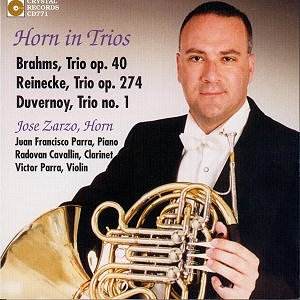An entirely Spanish production issued by the US company
Crystal. The soloists are all members of the Ensemble Isola which is
drawn largely from the Gran Canaria Orchestra familiar to us from their
appearances on Naxos. The recording was sponsored by the horn playerís
brother and recorded in Las Palmas. The only part of the CD not clearly
Spanish is the English notes, for which Crystal have unfortunately omitted
credit. They are useful and well written by the anonymous contributor
but printed in the same weird order I commented on previously in my
review of the American Brass Quintet (see elsewhere Crystal
CD214).
Brahmsí Trio Op.40 is a splendid work with a surging
first movement, an exciting scherzo and a very beautiful adagio
mesto slow movement. The finale rather stopped me in my tracks.
I have not listened to this Trio for a very long time, so why was this
allegro con brio, typically Brahmsian, lively dramatic and utterly
memorable, so very familiar? My musical friends all reacted the same
way but were unable to cast light on the mystery. Brahms did not use
the tune elsewhere so far as I can discover. Perhaps someone has been
using it as a signature tune on Radio or TV. The three soloists are
fine musicians and they play Brahmsí piece with considerable power and,
necessarily for the treacherous horn part, accuracy. I enjoyed this
very much and was again reminded that Brahms often cries out for larger
forces than those for which he is composing.
The recording is well balanced, all the lines are clearly
delineated, and the horn, a difficult instrument to record because it
so often seems to overflow its acoustic space, is allowed room to breathe.
Towards the end of Carl Reineckeís worthy but dull Trio I did notice
a couple of editing glitches on the master tape (track [7] 4:59 and
5:04 to be exact) which came in the middle of a track where I also noted
a decline in recording quality. Since my CD system did not display disc
errors I assume the master to be at fault. This problem seems to clear
up in the final piece, the Duvernoy.
I dismissed Reinecke as worthy but dull. It has the
Brahmsian characteristics of seriousness and rich harmonies but little
of the masterís spark of inspiration. The most interesting thing about
this trio is that Reinecke should have chosen to compose a clearly serious
piece for the unusual combination of horn, clarinet and piano. The scherzo
makes impressive use of the bottom register of the clarinet. The finale
starts off in lively fashion but soon returns to what the sleeve-note
calls euphemistically "a more customary Reinecke style". Quite
so. Duvernoy was a famous horn player in his day and his short trio
has a slightly faceless adagio succeeded by a dramatic allegretto
that, I guess, would not have displeased Mozart. A surprising pleasure.
Dave Billinge
